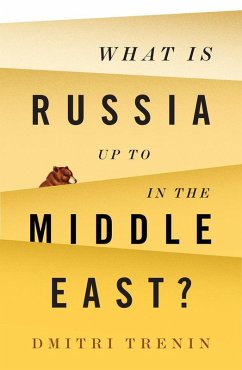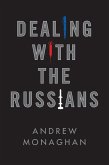Dieser Download kann aus rechtlichen Gründen nur mit Rechnungsadresse in A, B, BG, CY, CZ, D, DK, EW, E, FIN, F, GR, HR, H, IRL, I, LT, L, LR, M, NL, PL, P, R, S, SLO, SK ausgeliefert werden.
Hinweis: Dieser Artikel kann nur an eine deutsche Lieferadresse ausgeliefert werden.
Financial Times
"A timely narrative of Moscow's noisy, though deftly executed and clearly efficient, re-insertion in the Middle East. Trenin is deeply familiar with the Kremlin's decision-making though cognizant of Russia's limited resources. Heavily informed by geopolitics, Trenin convincingly demonstrates the large impact of regional politics on the shifting equations among global powers."
Ghassan Salamé, Professor of International Relations Emeritus, Sciences Po, Paris
"Trenin offers an indispensable and authoritative account of Moscow's motivation in the Middle East. Rooted in history and lucidly told, he paints a compelling portrait of Russia as a power "with no permanent friends and no eternal enemies", ready to kick over regional tables on its global comeback to geopolitical top table."
David Gardner, International Affairs Editor, Financial Times
"The Russian media treatment of Syria has remained too insulated for too long from the larger international dialogue about the war and Russian-American relations. The West would clearly benefit from a better understanding of the Russian perspective -- which is not to suggest that the Russian media's portrayal of the country's Middle East strategy should be taken at face value. Fortunately, a far more sober and comprehensive account of the Russian government's objectives in the region, and its blind spots, is available in form of Dmitri Trenin's short new book, What Is Russia Up to in the Middle East?"
Foreign Policy
"How did Russia engineer its return to the Middle East? In this succinct, lucid account, Dmitri Trenin reminds his readers of Russia's long historical ties with the region, and also of the domestic factors that have driven the Kremlin to pursue an interventionist policy there."
Angela Stent, Survival









